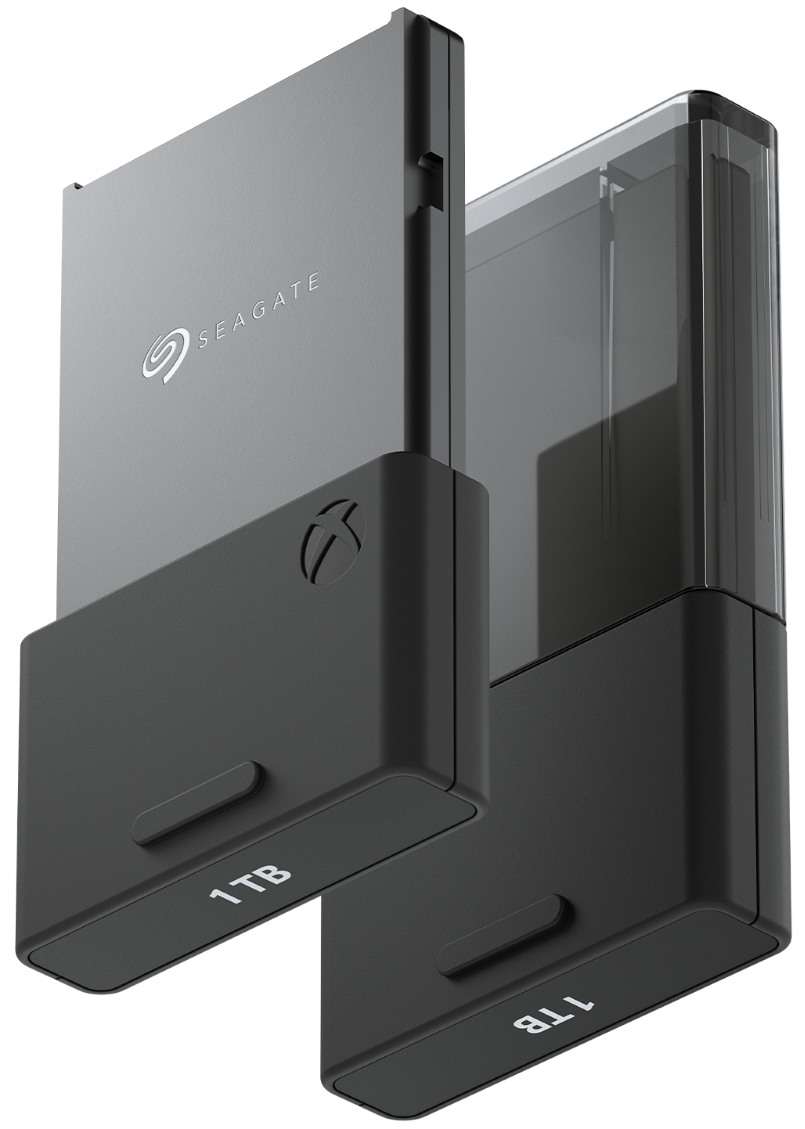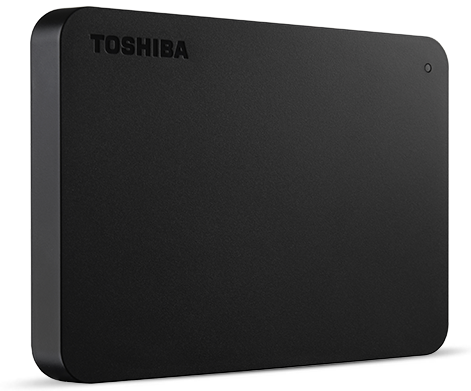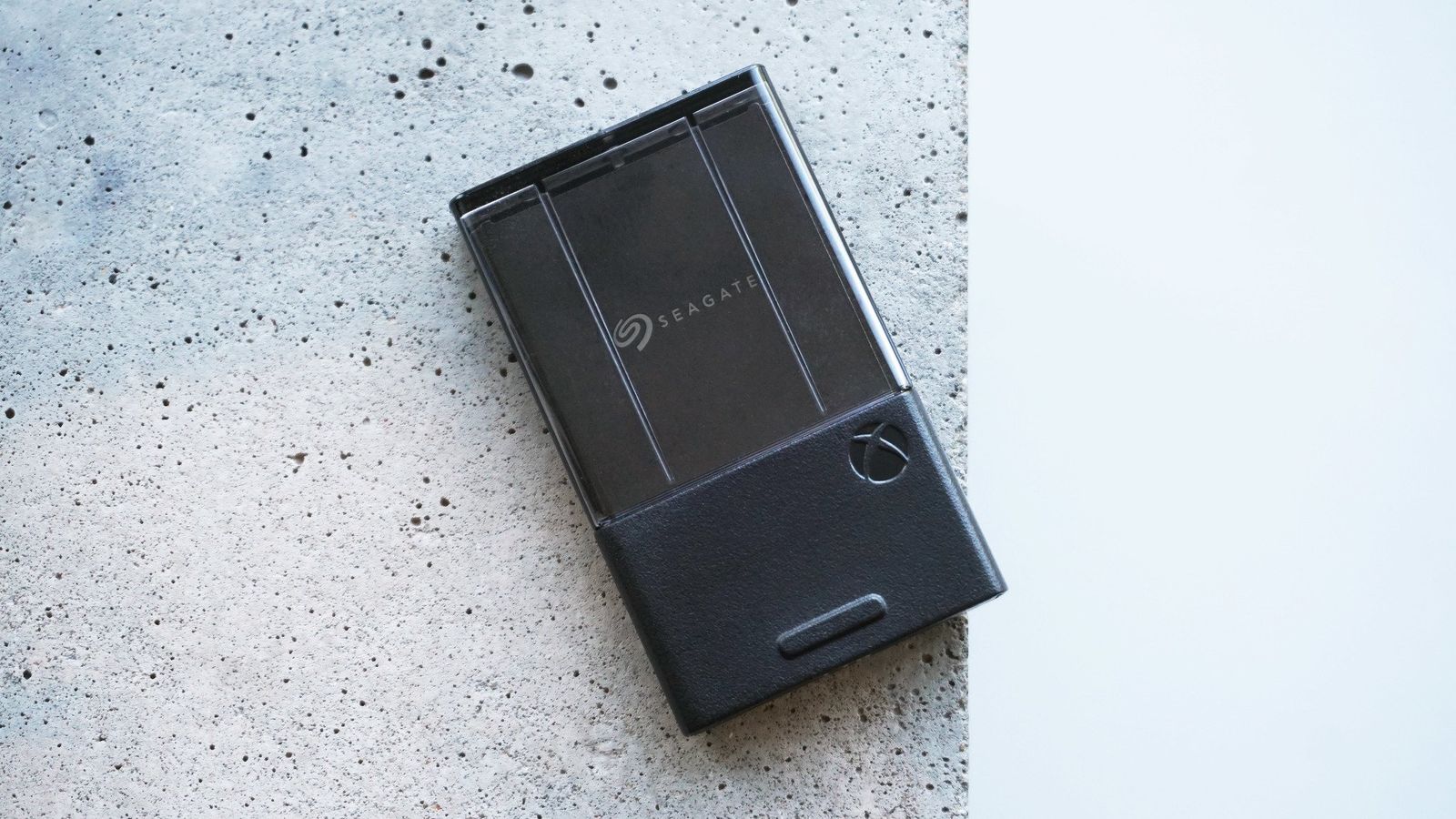 Source: Matt Brown | Windows Central
Source: Matt Brown | Windows Central
The Xbox Series X and Series S introduce significant storage gains, adopting custom solid-state drives (SSDs), poised to cut back loading screens to a minimum. Microsoft positions that high speed as fundamental to its next-generation vision, also introducing changes to storage. With that comes the arrival of a proprietary memory card-style SSD, while USB external hard drives take a backseat for backward compatibility. Here’s what you need to know about your available storage options on Xbox Series X and Xbox Series S, and what each entails.
See all the very best Xbox storage and hard drive deals we could find right here.
Expanding Xbox Series X, Series S storage: The TLDR
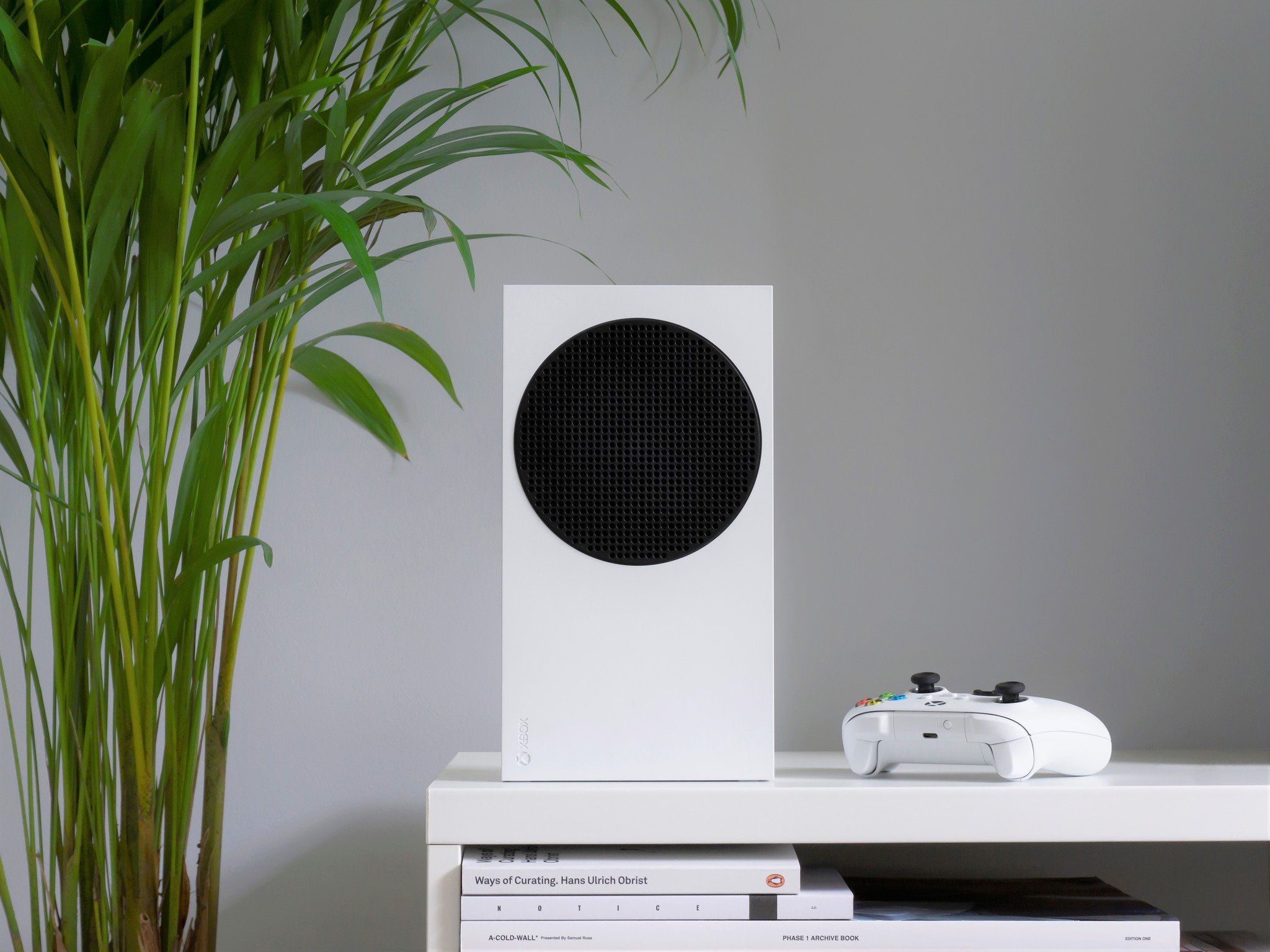
Xbox Series X and Xbox Series S pack shared custom NVMe SSD storage technology, bringing up to 40 times speed increases over the Xbox One family. The Xbox Series X ships with a 1TB internal SSD drive, while the Xbox Series S features a reduced 512GB capacity out of the box. In reality, Xbox Series X has just 802GB of space usable for games, with Xbox Series S offering just 364GB.
When your games library eventually fills the internal drive, Microsoft provides two primary routes to increase your available storage on Xbox Series X and Series S. It worked on the Xbox Seagate Storage Expansion Card, mimicking the internal SSD with identical performance. It also supports USB hard drives like Xbox One consoles, although this time with limitations attributed to slower speeds.
In brief — the list of Xbox Series X and Series S Optimized games needs high-speed storage, and only the internal SSD or official expansion card can deliver. While USB hard drives work fine, they only store those games, and you will need to transfer them to the SSD to play. However, backward-compatible titles, including Xbox 360 and original Xbox games, work fine on USB drives. Here’s a handy breakdown of how USB drives compare to the SSD expansion card.
| Internal SSD | Seagate Expansion Card | USB external drive | |
|---|---|---|---|
| Xbox Series X/S games | ✓ | ✓ | Storage only |
| Xbox One games (upgraded) | ✓ | ✓ | Storage only |
| Xbox One games (not upgraded) | ✓ | ✓ | ✓ |
| Xbox 360 games | ✓ | ✓ | ✓ |
| Original Xbox games | ✓ | ✓ | ✓ |
The challenges around storage space only grow for Xbox Series X and Series S, with top titles larger than ever. The latest blockbusters often surpass 100GB, with the added increased capabilities of the latest consoles unlikely to reverse that trend. While Microsoft states that on average, Xbox Series S titles should clock in 30% smaller than Xbox Series X, storage is far from plentiful on either device.
Xbox Series X, Series S Seagate Expansion Card

With Xbox Series X and Series S focused on processing capabilities and speed, games designed for the consoles require the full bandwidth of its custom storage technologies. Traditional USB devices fail to hit the mark, which led Microsoft to pursue a custom expansion card. In short, it’s a fast proprietary memory card to expand your storage, guaranteed to meet the standards for Xbox Series X and Xbox Series S.
Where to buy Xbox Series X, Series S Seagate Expansion Card: Price and size
The Seagate Storage Expansion Card for Xbox, as expected, is more than your everyday hard drive. It costs $220 in the U.S. for the 1TB model, which fell in line with our previous predictions, given the average pricing for current PCIe 4.0 SSDs. That translates to £220 in the U.K., $300 in Canada, or €270 in Europe. While undeniably a premium device, it’s a result of the bleeding-edge console hardware.
Expand your Xbox
Seagate Expansion Card for Xbox Series X|S
Powerful storage comes in a small package
Microsoft and Seagate have teamed up on a compact expansion card for Xbox Series X and S consoles. It leverages the same custom SSD technology seen inside both devices as the only expandable storage solution capable of playing next-generation games.
The cards come in only slightly larger than your average USB thumb drive, with a sliding cover for safekeeping. They connect via a dedicated rear port on either console, which hooks up directly to the processor. That provides cutting-edge speeds, but the PCIe 4.0 tech used is also notoriously costly, driving up the RRP.
We continue to wait for more storage options beyond the 1TB Seagate Storage Expansion Card, with more capacities and brands expanded in the future. Microsoft remains quiet on when to expect new products, but we’re hoping to hear more as the one-year anniversary for Xbox Series X and Series S approaches.
The Seagate Storage Expansion Card for Xbox Series X and Series S targets enthusiasts demanding the best, exactly matching Microsoft’s baked-in solution. It guarantees the best across internal and external storage if you can take the hit.
How to use the Xbox Seagate SSD Expansion Card
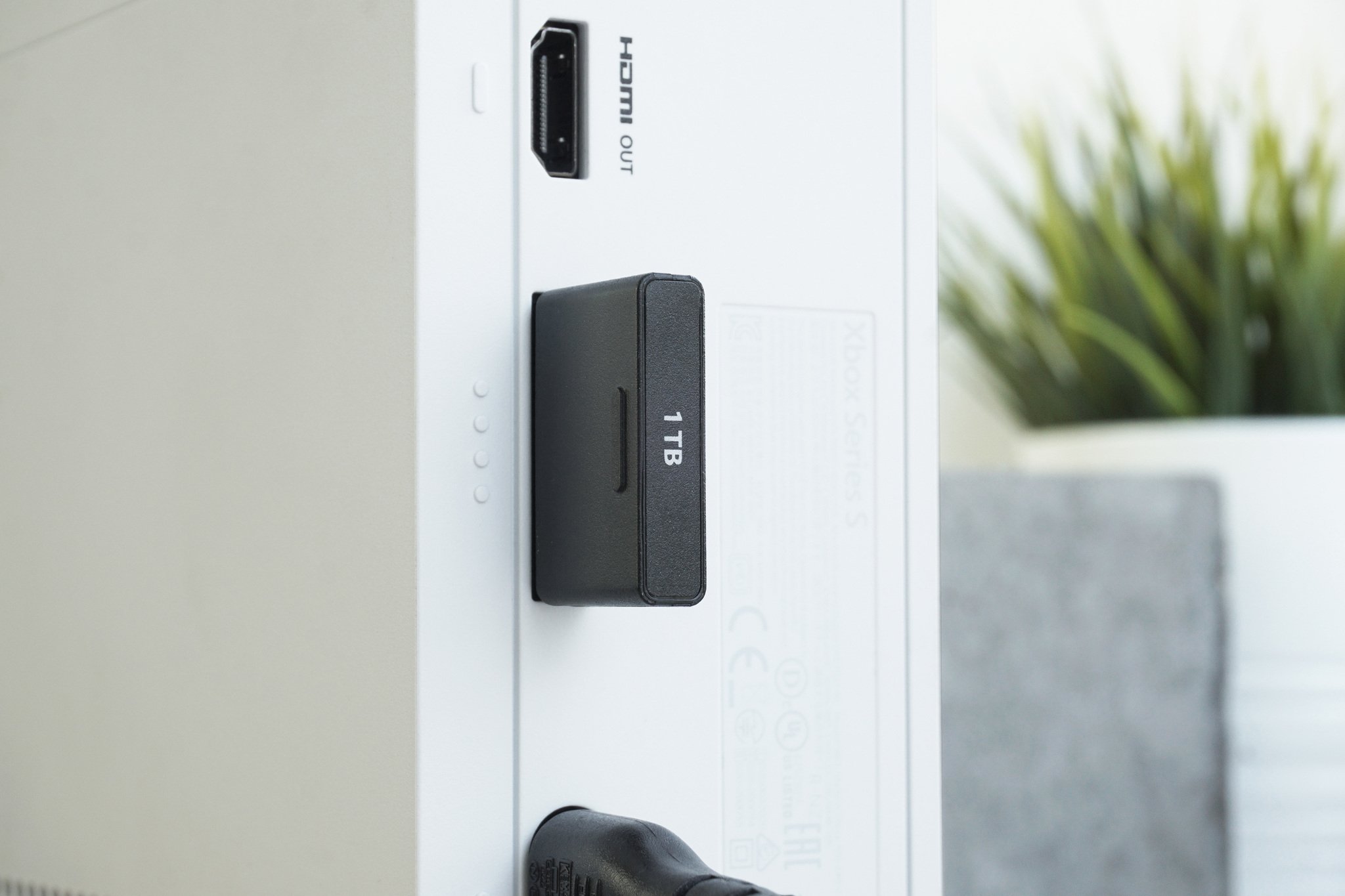
The Seagate Storage Expansion Card connects to Xbox Series X and Series S via a dedicated, proprietary connector on the console’s rear. The rectangular port sits adjacent to the HDMI output on both consoles, labeled with “STORAGE EXPANSION.” Upon removing the included plastic cover, the SSD slides into the port, slightly protruding from the back I/O panel.
Microsoft allows external SSD cards to be inserted with the console turned on, enabling those with multiple expansion cards to hot-swap on the fly. When inserted, the Xbox Series X or Xbox Series S will automatically recognize and configure your external storage.
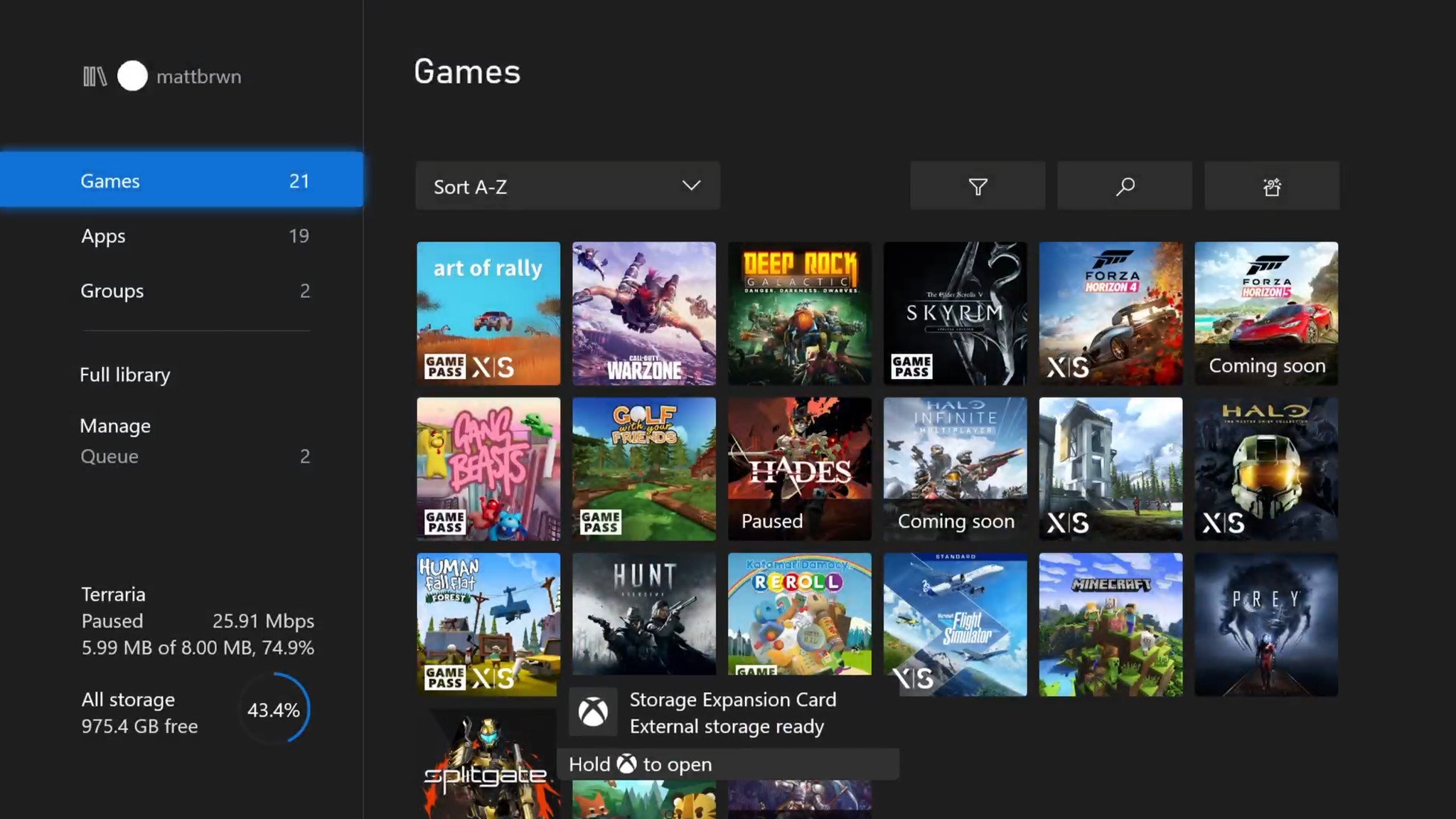
- Remove the protective sleeve included with the Xbox Storage Expansion Card.
- Insert the Expansion Card into the Storage Expansion port.
- Firmly press the Expansion Card until it emits a distinct click. Your Xbox console will automatically detect and configure the Xbox Storage Expansion Card, coupled with an on-screen notification.
Once configured to work with your Xbox Series X or Xbox Series S console, the Xbox Storage Expansion Card will add 920GB to your pool of available Xbox storage. You can copy, move, and install content between the internal SSD and the external Expansion Card.
Does Xbox Series X, Series S support USB external hard drives?
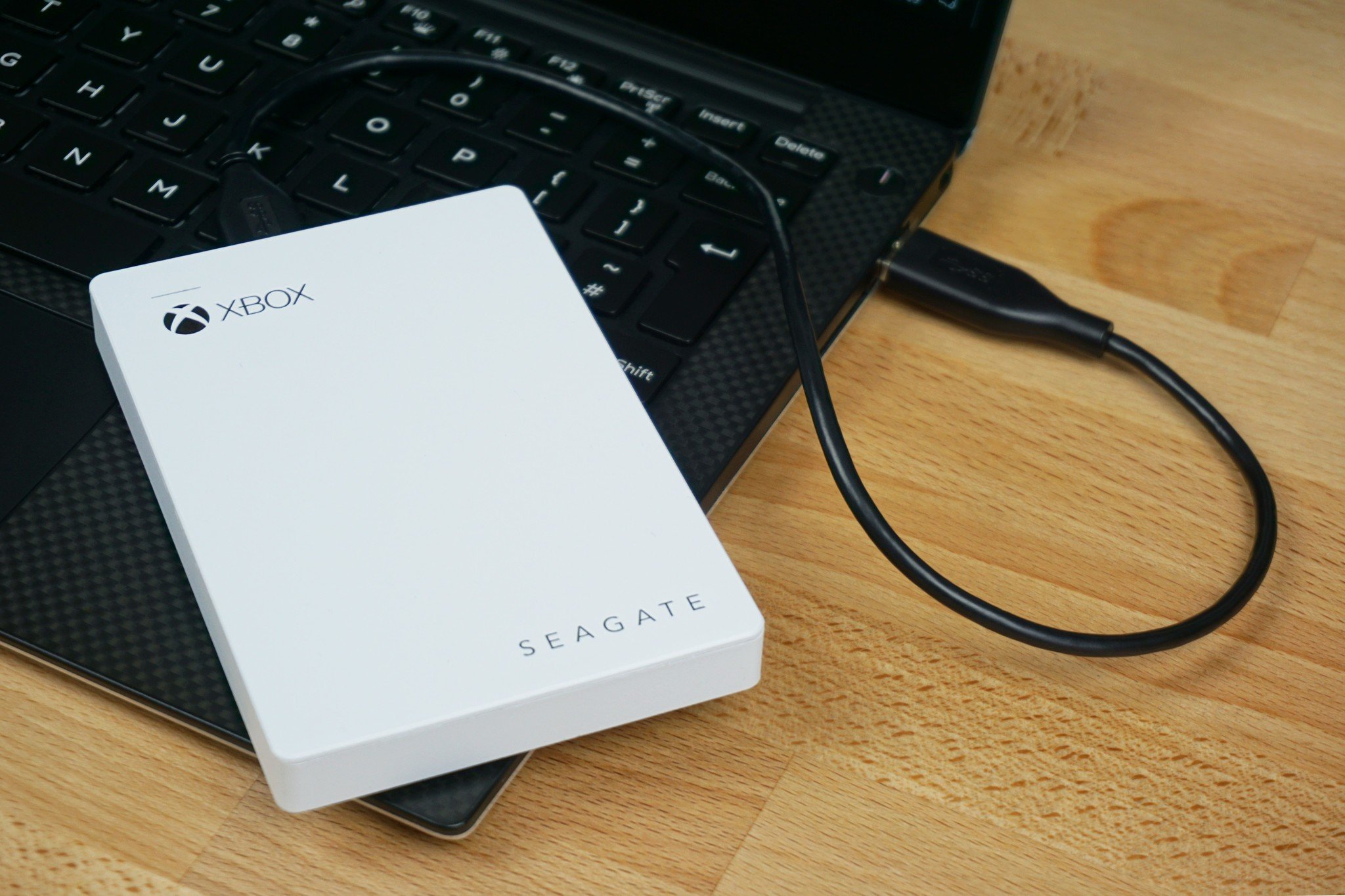
Microsoft supports almost all Xbox One accessories with Xbox Series X and Series S, extending to the existing storage ecosystem. That guarantees partial compatibility for external hard drives from the Xbox One era via USB connectivity. It makes them an ideal, budget-friendly alternative to the official Seagate Storage Expansion Card, especially when offloading titles from the internal drive.
However, USB drives don’t match Microsoft’s custom SSD speed, imposing significant limitations on their capabilities. Xbox One, Xbox 360, and original Xbox titles all run on an external USB hard drive with Xbox Series X and Series S. And provided previous-generation software doesn’t receive Xbox Series-geared upgrades, it also runs on USB storage.
But Xbox Series X and Series S titles won’t run on external hard drives due to slow transfer speeds, failing to meet next-generation demands. An internal SSD or an external expansion card is required for upcoming releases or older games updated for Xbox Series X or Series S.
But with the high price of the SSD expansion card, it’s worth stressing that all Xbox Series X and Series S titles can be offloaded to an external USB hard drive. While some titles may not be playable from the slower storage, it’s still possible to shift data between an SSD where your games can be playable and a USB for storage. Your USB hard drive’s transfer speeds will determine how fast they move back and forth, but it’s a useful way to cycle games from the internal SSD without investing in the $220 expansion card.
How to use a USB external hard drive with Xbox Series X, Series S
Most modern external hard drives work on Xbox Series X and Series S consoles, expanding your capacity for games, with speedier load times also obtainable via compatible SSDs. You’ll need a USB 3.0 external drive to meet the requirements, ensuring high data transfer rates to run backward-compatible games over a USB connection. Compatible drives must also have at least 256GB of storage, although we recommend shopping for at least 1TB for future peace of mind. Don’t forget that the best Xbox One hard drives and SSDs are also compatible with new Xbox consoles if you’ve recently made the upgrade.
The Xbox Series X and Series S feature USB-A ports, making it important to check whether an external hard drive uses the correct connector to hook up to the console. That’s especially important with modern SSDs, more commonly using USB-C connectors to achieve the highest possible transfer speeds. The two consoles feature twin rear-facing USB-A ports, ideal for hiding external hard drives while freeing up the front port.
You’ll also need to permit your console to format the drive, losing all data currently stored onboard. It’s crucial to back up ANY stored files to avoid losing existing documents and data.
Your Xbox console will automatically detect external storage when connecting a USB external drive, with on-screen prompts to ease the setup process.
Best Xbox Series X, Series S external hard drives
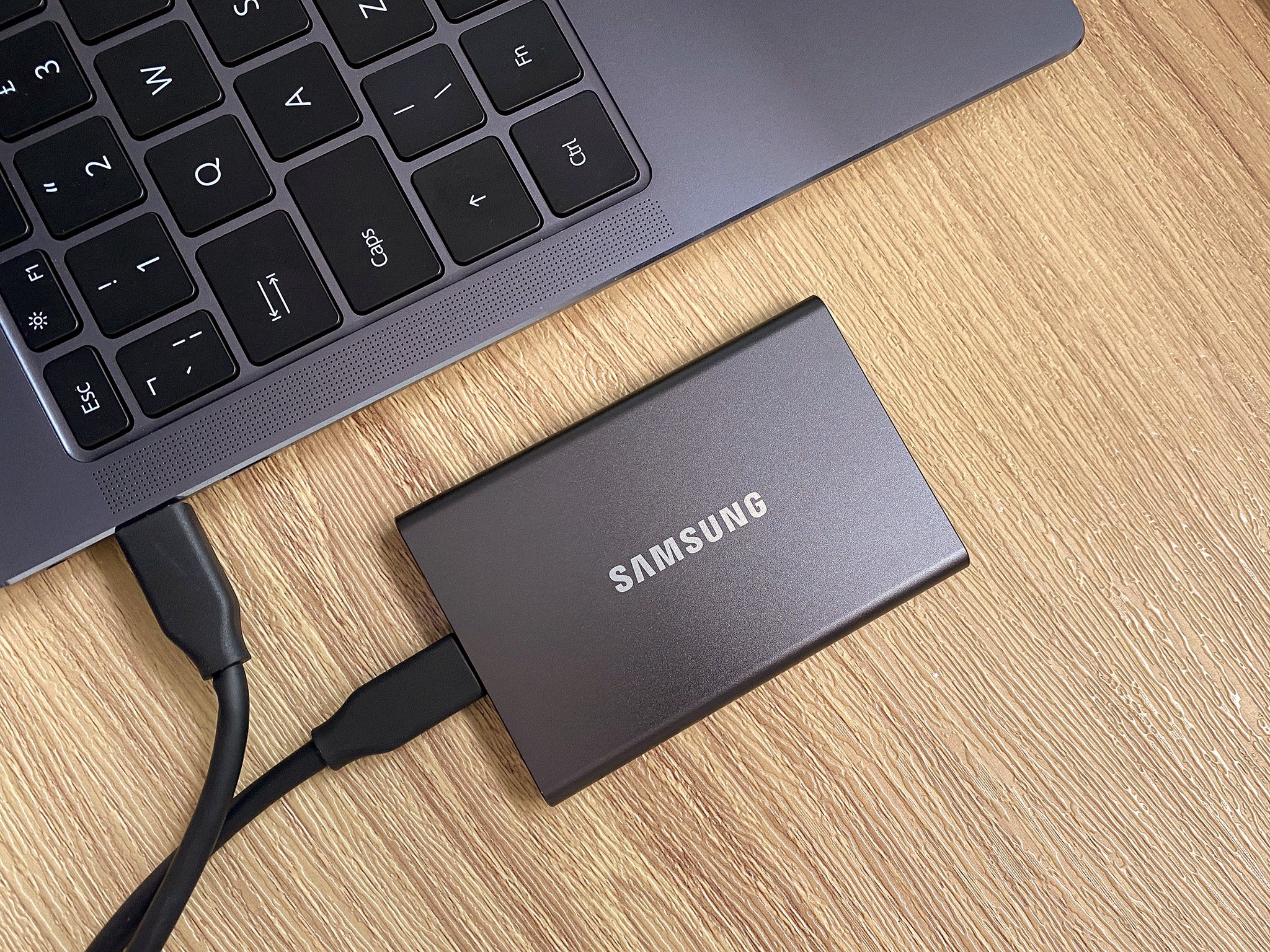
If the SSD Expansion Card isn’t for you, a vibrant ecosystem of USB-connected hard drives will meet demands for Xbox One, Xbox 360, and original Xbox titles. These storage solutions all function with Xbox Series X and Series S today, multiplying your console’s capacity, with plug-and-play access also guaranteed for older Xbox One consoles.
The best Xbox Series X hard drives start as cheap as a video game, with Toshiba offering reliable storage within performance demands below $50. That 1TB expansion can over triple your room across some consoles like Xbox Series S.
Affordable and easy
Toshiba Canvio Basics 1TB external hard drive
Expand your Xbox console from less than $50
Expanding your Xbox storage doesn’t need to be expensive, and this 1TB hard drive is one of the cheapest options out there. It’s performant to support Xbox One games and older backward-compatible titles, while also ideal for offloading Xbox Series X/S games.
Go big or go home with this 4TB behemoth from Seagate, providing room for your full games collection for the average user. It offers four times the internal capacity that ships with Xbox Series X, proving an essential pickup today and all you’ll need as a next-generation sidekick. While SSDs are incredibly costly in these sizes, slower hard drives remain affordable right now.
High capacity, low price
Seagate Portable 4TB external hard drive
Get more Xbox storage for all your gaming needs
This 4TB Seagate portable drive is all you need, hitting the highest capacity of its USB-powered drives. Formidable speeds and space for dozens of games make this ideal for any frequent gamer.
Opting for an SSD will boost your read and write speeds over a traditional hard drive, cutting load times across your favorite titles on Xbox One consoles. And while even the best external SSDs for Xbox Series X and Series S don’t meet the demanded speed for Xbox Series X|S Optimized titles, that boost still comes in handy for backward compatibility or fast transfers to your internal SSD.
Need for speed
Samsung T7 500GB portable SSD
A storage speed boost that fits the budget
Samsung’s T7 500GB external drive packs top-tier speed below $100. You’re getting an over 50% boost in capacity with Xbox Series X while over doubling Xbox Series S. That speed won’t match what’s inside either console, but it’s still a vast improvement over other USB drives. Encased in a shock-resistant metal finish; it fits stealthily beside any console.
A caveat: Play Xbox Series X|S games via USB drives
Titles developed with upgrades for Xbox Series X and Xbox Series S need Microsoft-approved SSD storage, but diving into the technicalities, that’s not always the case. The way Xbox Series X|S Optimized games are developed means that some don’t require the full benefits of SSD storage and operate via USB-based storage devices. Under the hood, these titles essentially run as standard Xbox One games, only with some enhancements when booted on Xbox Series X and Xbox Series S systems.
In reality, that means some Xbox Series X|S Optimized titles can be on USB hard drives, even if not formally intended. While entirely functional, this may impact performance or load times when running these titles on your system. You can identify these games through the following steps.
- Open My games & apps on your Xbox console.
- Navigate to your chosen game.
- Press the Menu button.
- Select Manage game and add-ons.
- Select the File info tile.
- If the fourth line of displayed text reads
AppModel:XDK; Gen:Durango;and the sixth line readsConsoleType:XboxOneGen9Aware;the game still runs on external USB hard drives. - If the fourth line of displayed text reads
AppModel:GDK; Gen:Scarlett;and the sixth line readsConsoleType: XboxGen9;the game doesn’t run on external USB hard drives.
- If the fourth line of displayed text reads
Various top Xbox Series X|S titles are among those compliant with USB drives, including Halo: The Master Chief Collection, Rocket League, Call of Duty: Warzone, and Minecraft Dungeons, to name a few. Check your Xbox games via the above steps for additional details on your library.
Seagate Expansion Card vs. USB: Which is for you?
When your Xbox Series X or Xbox Series S runs low on storage, your decision to expand primarily hinges on whether to invest in the official Seagate Storage Expansion Card for Xbox. With fast storage fundamental to titles designed for the next generation, this external SSD offers a seamless solution at a high price. The cost may deter some but reflects the reality of the hardware.
Investing in a USB external hard drive may be more appropriate when looking for an affordable alternative. Connecting USB devices is an easy way to store your games, even if the limitations mean you can’t play without moving them to your internal SSD. It saves redownloading titles, provided you’re happy to cycle them back and forth.
We may earn a commission for purchases using our links. Learn more.

Here are the best steering wheels for Forza Horizon 5
Forza Horizon 5 features extensive and improved support for simulation steering wheels. To get the most out of this open-world racing game, consider one of the best racing steering wheels available for Forza Horizon 5.


